Ljubljana related
STA, 26 February 2020 - Three local communities in the north-eastern region of Prekmurje are upset after a cable operator announced it was expanding its TV package in the area with programmes catering for the Hungarian minority, which does not in fact live in the three municipalities. The development comes amid concerns about Hungary's expanding influence in the region.
Telemach said it would include five Hungarian programmes in its package in Lendava, Odranci, Velika Polana and Črenšovci, in response to the wishes of the Hungarian community in the area. The latter three communities are not bothered by the new programmes, but rather by the reason given for the move.
Jožef Horvat, the head of the parliamentary faction of the conservative party New Slovenia (NSi), has alerted the government in a letter that Hungary's influence in the municipalities with exclusively Slovenian population is expanding through the programmes.
"We are not bothered by the programme scheme and business decisions of a private subject even when it comes to bilingual programmes, but it does bother us that in its official release the company stated that this was in accordance with the wishes of our municipalities' residents and labelled them as bilingual, which they aren't," Velika Polana Mayor Damijan Jaklin said.
In his letter, MP Horvat said that it was commendable that the Pomurje Hungarian community was aspiring for Hungarian programmes, but that it was unacceptable that in public explanations Črenšovci, Velika Polana and Odranci were listed as mixed ethnicity areas populated by a sizeable Hungarian minority. "This is simply not true and it is common deceit."
Horvat, whose party has just agreed to be part of a new government formed by Janez Janša, the leader of the Democrats (SDS), accused the outgoing government of silently watching developments in Prekmurje, asking what it was planning to do to protect the majority nation and language in the region.
Črenšovci Mayor Vera Markoja says that Telemach has apologised to the community for declaring it is home to a Hungarian minority. The company told the STA its purpose was not to cause discord or "declare ethnically mixed areas", but rather to offer a choice of quality content to all viewers across the country.
Telemach said that as part of its switch to the digital programme scheme new Hungarian programmes would be available throughout the country. The company has one TV signal for Lendava, Odranci, Velika Polana and Črenšovci, which means separating the programme scheme by municipalities impossible.
Prekmurje has in recent time seen extensive Hungarian state and private investment, which has sparked considerable attention. While some see the investment as welcome aid benefiting the entire population of the underdeveloped region, others see it as Hungary expanding its influence in a region what used to be part of the Hungarian empire.
Hungarian investments in the region include the acquisition of the spa Terme Lendava, unofficially at the cost of EUR 9 million, EUR 6 million investment in the Lendava football academy as well grants distributed to individuals and entrepreneurs commanding Hungarian language.
Opinions on the Hungarian aid are also divided within the Hungarian ethnic community in the region with some arguing that the investments do not generate economic effects and questioning the motives behind them, suggesting that Hungarian Prime Minister Viktor Orban was trying to assert his ways also in Slovenia.
Hungarian MP Ferenc Horvath believes that the aid is welcome. "Slovenia too should give as much here. Aid is welcome in the region. These are public funds, we know where they are destined, and they are also a contribution to Slovenia because money is spent here and taxes are paid here as well."
A similar view was taken by the SDS, which is facing allegations that media with ties to the party have received funds from Hungary.
The SDS believes that the Slovenian government is neglecting Prekmurje as well as the Slovenian minority in Hungary, "which is why the Hungarians help both". "If our investment was sufficient, the Hungarians would have nowhere to invest".
All our stories on Hungary are here
STA, 11 February 2020 - The National Bureau of Investigation (NBI, Nacionalnega preiskovalnega urada – NPU, “Slovenia’s FBI”)) is investigating the funding of some media outlets close to the Slovenian Democratic Party (SDS), public broadcaster TV Slovenia reported. The police refuse to comment.
The media are suspected of having received funding from Hungarian business people with close ties to Fidesz, the party of Hungarian Prime Minister Viktor Orban, TV Slovenija said.
The news comes after web portal necenzurirano.si reported on Monday that EUR 4 million were transferred since August 2018 from accounts in the UK and Hungary to accounts in Slovenia.
EUR 1.5 million allegedly ended up on the accounts of media companies NovaTV24.si and Nova Hiša, the broadcaster of the TV programme and publisher of Nova24TV.
Related: Hungary’s Influence in Prekmurje and Beyond
The rest allegedly went to North Macedonia for the purchase of media companies from the circle of Macedonia's biggest opposition party VMRO-DPMNE.
Necenzurirano.si also said that the funds were the key source of income for NovaTV24.si and Nova Hiša.
In 2018, total earnings of NovaTV24.si reached EUR 1.54 million, only EUR 300,000 more than the total sum of Hungarian funds since August 2018 until today. Whereas the earnings of Nova Hiša in 2018 reached EUR 324,000.
The portal said that the two media are close to the SDS, because several party members sit on the management board of NovaTV24.
Related: Parliamentary Committees Condemn Hungarian Interference in Slovenian Media
SDS leader Janez Jaša accused NBI head Darko Muženič in a tweet today that he had allowed millions to be laundered in NLB bank and was now investigating the media that reported about it.
The SDS has repeatedly rejected speculation about illegal funding for the party from abroad. What is more, the party has threatened to sue outgoing Prime Minister Marjan Šarec for saying that the SDS had received funds from Hungary.
Balkan Insight has just published a three-part series looking at the efforts of the Hungarian Prime Minister Viktor Orban with regard to the “virtual reunification” of the country under his form of “illiberal democracy”, with lavish spending aimed at courting the ethnic Hungarian communities in neighbouring states, as well as the wider media and political scenes. The series looks at Slovenia, Serbia and Romania, and what follows is a summary of the first, “In a Hungarian Corner of Slovenia, a Homegrown Orban”, by Akos Keller Alant.
2/3 of the country was taken away https://t.co/ZYKJH78pcm pic.twitter.com/HGngXuvChw
— About Hungary (@abouthungary) June 4, 2019
Slovenia Condemns Orban-related Tweet Claiming Prekmurje Was Stolen From Hungary
The story opens in 2016, when a theatrical production of a Hungarian musical was to be staged in Lendava, aimed at Slovenia’s 6,000 or so ethnic Hungarians. However, the Hungarian Self-Governing National Community, or MMONK, which is tasked with representing the community, tried to get the show cancelled, with no official reason given by the president, Ferenc Horvath. Still, the organiser felt that perhaps the real reason was the fact the performance would mean royalties would have to be paid to an institution in Budapest known for its support of liberal causes, including migrants and refugees, a group Orban is among the most vocal in Europe with regard to opposing
Related: New York Times Examines Orban’s Media Allies in Slovenia
The performance went ahead, but since then the theatre company has been disbanded due to lack of funding, while Lili Keep, the women who organised the performance, was forced out of her job as director of the Institution for Hungarian Nationality and Culture, replaced by Horvath’s deputy at MMONK. Keep claims that she was pushed out because she was too liberal, a fact that Horvath doesn’t dispute, although he adds that it was because she was finically too liberal, and couldn’t maintain the Institution’s finances.
This, the story claims, is symptomatic of the control Budapest has over ethnic Hungarians over the border, which is also financial, due to generous spending (especially since 2015), as well as offering other inducements to identify more strongly with the homeland and vote, such as making getting Hungarian citizenship easier. Such efforts, when they make it to the ballot box, see landslide wins for Fidesz (Orban’s party) among Hungarians outside the country.
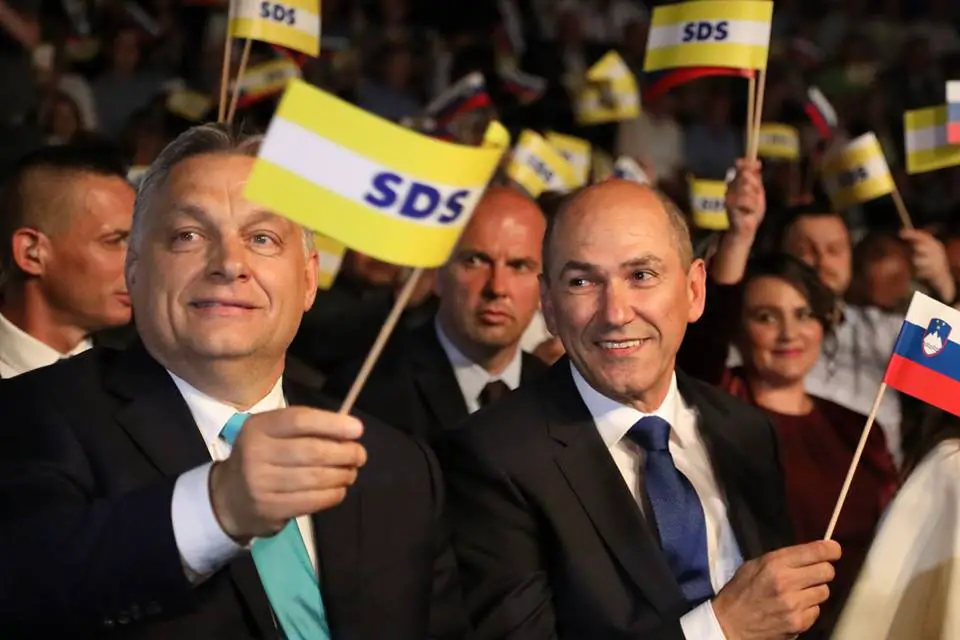
Victor Orban and Janez Janša at an SDS rally, 2018. SDS' Facebook page
Horvath, since 2018 a deputy in the Slovenian Parliament, is now the main go-between for the governments in Ljubljana and Budapest when it comes the Hungarian community in Slovenia. He has also changed the statues of MMONK and, according to historian Attila Kovacs, a former local councillor in Prekmurje, taken power away from the community and placed it in his own hands.
Related: Parliament Opens Inquiry into Foreign Money in Slovene Politics, Focusing on SDS & Hungary
As Kovacs tells Balkan Insight: “Mr. Horvath uses his power in an authoritarian way. He appoints people loyal to him to every important position, while he marginalises everyone who is critical of his politics.”
The benefits of being winning Horvath’s favour can be considerable, since he’s responsible for assigning the funds received from Hungary. These have grown rapidly in recent years, from just €222,000 in 2015 to just under seven million euros since 2016.
Horvath’s election to Parliament led to an investigation by the state Committee for the Prevention of Corruption, which ordered him to resign as either an MP or president of MMONK, two positions he continues to hold, while – it should be stressed – maintaining his innocence.
Related: Parliamentary Committees Condemn Hungarian Interference in Slovenian Media
While in Parliament Horvath had himself appointed to a special committee investigating whether Janez Janša, the leader of SDS who won the last elections in 2018, but who was unable to form a government, received illegal campaign contributions from Hungarian allies of Orban.
The full article goes on to examine Horvath’s role in the Hungarian language media in Slovenia, the television arm of which was criticized in 2018 by the media ombudsman for being overly focused on the Hungarian government, Fidezs and its supporters. You can find it here.
All our stories on Hungary and Slovenia are here
STA, 28 October 2019 - Prime Minister Marjan Šarec and his Hungarian counterpart Viktor Orban called for strengthening economic cooperation between the two countries. The pair moreover urged a continuation of EU enlargement, while also discussing migration.
Hungary is Slovenia's sixth largest trade partner, with trade increasing by 9.1% in 2018 to exceed EUR 2 billion for the first time.
"I'm happy about this figure, but I'll be even happier if it will be higher," Šarec told the press after the meeting.
The pair meanwhile expressed regret that EU leaders recently failed to provide the green light for the start of accession negotiation talks with North Macedonia and Albania.
Šarec and Orban also talked about the situation of the respective minorities in Slovenia and Hungary, agreeing both needed to be secured opportunities for developing economically in the areas where they lived.
Premier @sarecmarjan in madžarski premier Orbán sta v pogovoru največ pozornosti namenila oceni dvostranskih odnosov, dinamiki gospodarskega sodelovanja ter možnostim za dodatno izkoriščenost obstoječega potenciala, aktualnim evropskim temam in izzivom v naši skupni soseščini. pic.twitter.com/8zDrrpxKbM
— Vlada Republike Slovenije (@vladaRS) October 28, 2019
Orban dedicated a substantial part of the press conference to migration, saying that the two countries knew very well what migration was and what it meant if a large number of migrants crossed the border in an uncontrolled way.
Šarec added that the issue of migration needed to be addressed at its root. "This is the joint task of the EU," he said.
The Slovenian PM was also scheduled to meet parliamentary Speaker Laszlo Köver and Slovenians living in Hungary.
Accompanied by Economic Development and Technology Minister Zdravko Počivalšek, Šarec also attended an annual promotional event hosted by the Slovenian Tourism Board (STO).
All our stories on Hungary and Slovenia are here
STA, 24 April 2019 - The parliamentary committees in charge of foreign affairs and culture have condemned the interference of Hungary in the freedom of press in Slovenia.
The committees met on Wednesday, less than three weeks after Hungarian Ambassador Edit Szilágyiné Bátorfi lodged a verbal note with the Foreign Ministry after the weekly Mladina ran on its cover a caricature of Hungarian Prime Minister Viktor Orban with his hand raised in a Nazi salute and surrounded by three politicians from the ranks of the Slovenian Democrats (SDS).
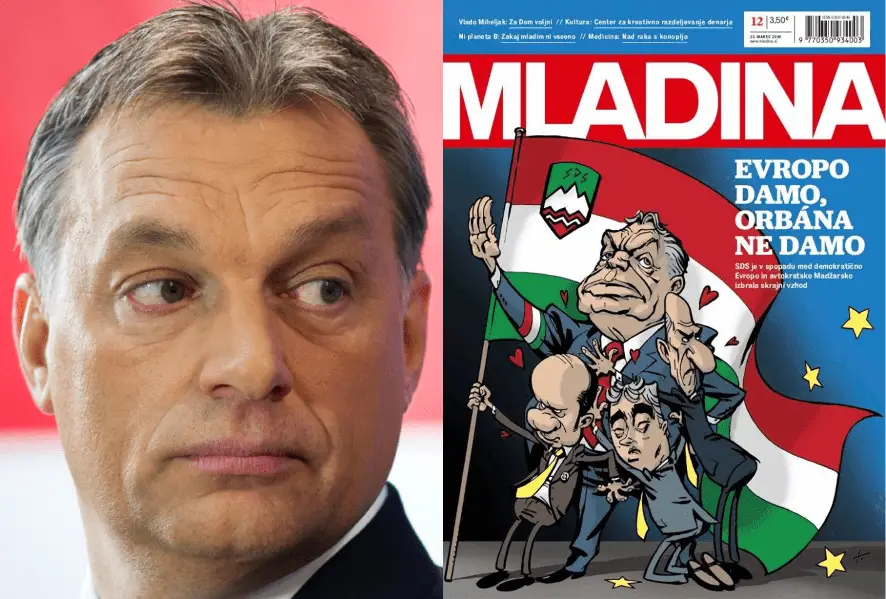
Sources: Viktor Orbán from Wikimedia - Europa Pont CC-by-2.0; Mladina’s Facebook
Apart from condemning Hungary's actions, the committees also proposed that the government make sure to protect the freedom of expression when revising relevant legislation, to preserve media ownership transparency, encourage free and plural media and install safety mechanisms to prevent interferences and pressures from other countries.
Modern Centre Party (SMC) MP Gregor Perič said at the session that Slovenia had faced "unusual responses by our neighbours", from contentious statements by European Parliament President Antonio Tajani, to Hungary's note, and wire taps indicating Croatian government attempted to prevent the release of a report about who listened in on Slovenia's representatives in the arbitration process in 2015.
Attending the session, Foreign Minister Miro Cerar said he would react decisively when basic values of democracy, human rights, the rule of law and Slovenia's sovereignty are under attack in the future.
He underlined the importance of nurturing good neighbourly relations, adding that the note lodged by the Hungarian ambassador had not caused a deterioration in bilateral relations.
Culture Minister Zoran Poznič meanwhile said that the ministry would draft a media legislation reform by the end of the year. He was responding to Mladina editor-in-chief Gregor Repovž, who called on the ministry to reform the legislation, above all to clearly define and separate the media from "propaganda working under the cover of media".
The session, called by the coalition parties the Marjan šarec List (LMŠ), the SMC, Social Democrats (SD), the Alenka Bratušek Party (SAB) and the Pensioners' Party (DeSUS), was criticised as a pre-election stunt by the opposition SDS and the Left.
All out stories about Slovenia and Hungary are here
April 9, 2019
Last week ended with news of a strange diplomatic move on the side of Hungarian government, whose diplomatic representative to Slovenia, Edit Szilágyiné Bátorfi, sent a verbal note of protest (an official diplomatic tool of interstate communication) to the Foreign Ministry of Slovenia, demanding it “prevent” further “politically irresponsible” “incidents” on the side of the Slovenian media. The note was prompted by the cover of Mladina magazine depicting Hungarian president Viktor Orbán in a Nazi salute, guarded by three Slovenian SDS party members, all in presumable reference to the SDS’ struggles to prevent Orbán’s Fidezs from being kicked out of the European People’s Party. “We give up Europe, but we don’t give up Orbán”, read the title.
Over the weekend, media outlets in Slovenia that are part-owned by Hungarian interested that were established and run by sympathisers of the Janez Janša and members of his SDS party, issued a series of articles, that praise the formal and informal Hungarian protests and criticise the Slovenian government and Slovene Association of Journalists (SAJ) for having double standards with regard to media freedom. As a proof of the latter, Demokracija reminds readers of its own cover, which was not that long ago a target of criticism by both the SAI and the government for “spreading hate speech”, since, according to Demokracija, “these terms are arbitrarily defined by the left political pole”. Furthermore, Demokracija emphasised that following a “really tasteless depiction of a foreign country’s prime minister”, Mladina then “instead of normal communication, which would become a supposedly serious news media” went on to make jokes on account of the Hungarian ambassador’s protest.

Before news of the official diplomatic note of protest broke, it was only known that the ambassador had sent an awkwardly assertive letter to the magazine, expressing “a protest against the way in which Prime Minister of Hungary was depicted”. Also in this letter the Hungarian ambassador wondered whether Mladina’s goal was to “stoke hatred among nations”, reminded the editor that such “distortions of truth” are “especially severe and unacceptable in times of election campaigns”, and concluded with an appeal to Mladina “to stop the negative campaign against Hungary”, since “you offend millions of people by doing so”.
Mladina then responded with another, “corrected” version of the cover and an “apology” letter by the cover’s author, Tomaž Lavrič. Lavrič, the no. 1 Slovenian comic book artist who received a Medal of Merit for his Exceptional Contribution in the field of Slovenian Illustration, as presented by President Borut Pahor in 2015, along with the Prešeren Foundation Award in 2017, has collaborated regularly with Mladina as its “house caricaturist” since his first Diareja strip in 1988.
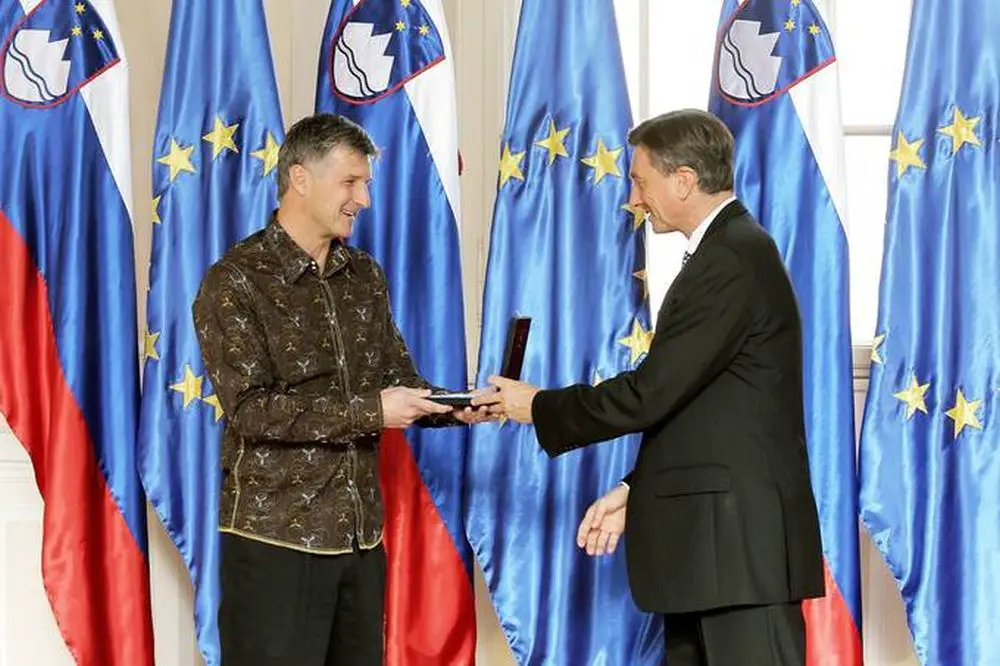
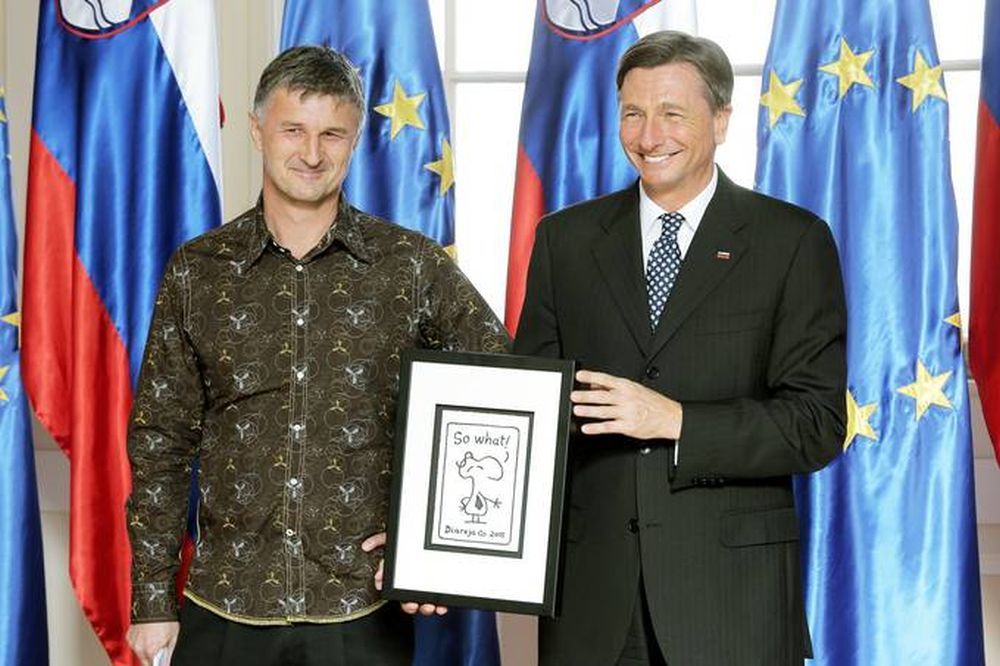
Apology
Much Honourable Madam Ambassador of the Republic of Hungary,
Accept my sincere and profound apology for a rude and completely untruthful depiction of your president Mr. Orbán on the cover of Mladina, which justifiably instigated your feelings of indignation and sadness.
After reading your concerned letter, I turned inside myself and realised my fault. I know that the anguish caused cannot be erased, but in my defence allow me nevertheless to explain that I myself am also just an innocent victim of objective circumstances. Let me point my finger at the real culprits of this undesirable scandal. These are:
- First, of course, a long-term communist education system which washed my brains and numbed my sense for nation and religion.
- Next to blame are my lackadaisical and inattentive superiors at the editorial board of Mladina, who should have better supervised me and stopped in time, as they know well that I am irresponsible and naïve in political matters, and just think that everything is allowed.
- And last but not least to blame is our permissive judiciary system, which fails to harshly and swiftly punish such social deviations.
I am urging you, madam, not to give up on us, but to continue to kindly help us with your advice and benevolent criticism, so that we too can achieve an exemplary state of objectivity and speak in one voice, as you have managed to establish in the Hungarian media, and that one day we too can live our lives under the rule of order and peace, national purity and Christian love for all the people behind the wire fence, as commanded by your mild and righteous beloved leader V. Orbán.
With all due respect,
Tomaž Lavrič, house caricaturist
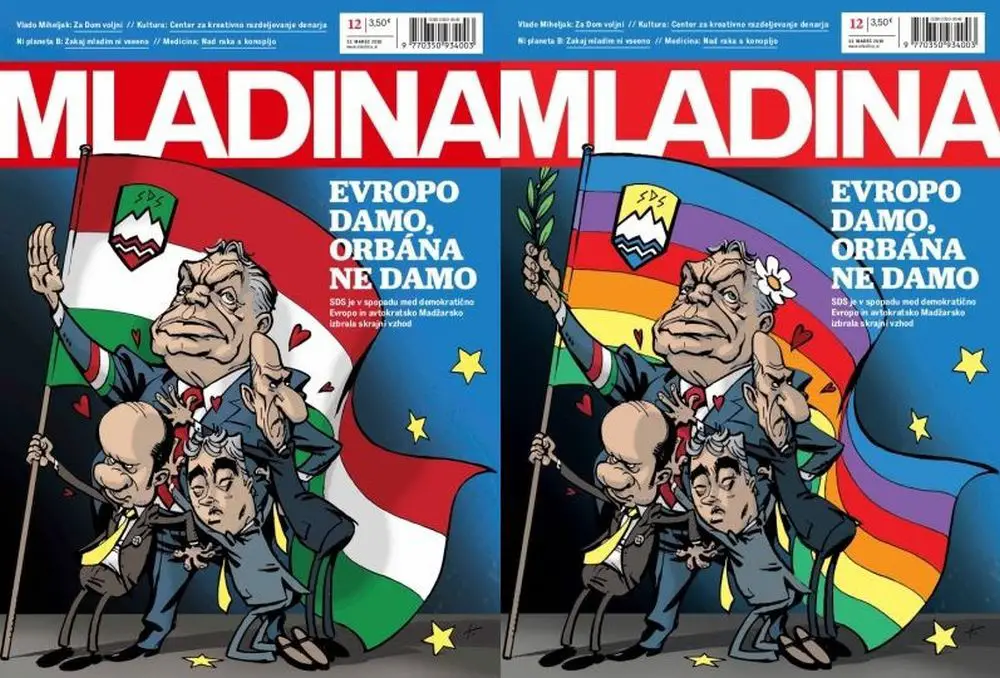
To explain the main problem behind the “outrageous” cover of Mladina, Demokracija also quoted the Hungarian government spokesperson Zoltán Kovács: “It’s an outrage and unacceptable first and foremost to the memory of the victims of that horrible period [World War 2]. Little surprise that the leftist editors at Mladina dislike the policies of the Orbán Government, but comparing the events of today’s Europe with the Nazi era trivialises what really happened in that dark time. (…) According to the author, Hungary’s firm opposition to immigration under the Orbán Government and our determination to protect European culture, which is deeply rooted in Christianity, is akin to the notorious German concept of Lebensraum.”
To understand the line of deduction here one might perhaps begin with the premise outlined by Milan Zver, MEP (depicted kneeling on the cover of Mladina) in his 2017 speech at the Pan-European Memorial for the Victims of Totalitarianism in Brussels: “Slovenia is the only state in the EU that has survived all three totalitarianisms: Fascism, Nazism and Communism. While the first two have practically disappeared, the process of the degradation of Communism has been too slow.” To paraphrase, we should not worry much about Nazism and Fascism, they are history. The Nazism of today is Communism, everything else is freedom fighting.
Furthermore, Kovács writes that “while everyone has the right to express an opinion, there’s also the matter of discretion and professionalism” and notes that Mladina’s function used to be the one of a “mouthpiece of the youth wing of the Communist Party”. Surely the Hungarian government spokesperson is aware of the fact that the lack of “discretion and professionalism” on the side of Mladina’s editors allowing for “juvenile and cynical” behaviour of its journalists has a long history which includes the imprisonment of three of its journalists (and one YPA sergeant) by the Yugoslav People’s Army in 1988, one of whom being no other than the leader of the SDS and admirer of Viktor Orbán’s policies, Janez Janša. At the time the arrests sent people onto the streets and launched Janez Janša’s career as a hero.

Another article by Nova24TV that followed on Monday, takes a similar path with regard to newspeak on contemporary sources of totalitarian danger. The author finds the Hungarian diplomatic protest “reasonable” since “if you were labelled Nazi by the media in the former Eastern bloc, which also included Hungary and Slovenia, it meant you were already on your way to gulag or being covered by soil. Also in Slovenia. The reaction [to the Hungarian reaction] bares a witness that this tradition is still alive. When a leftist weekly calls you a fascist, you aren’t even allowed to express your disagreement.”
If we may interrupt this narrative with a little correction – while Hungary was part of the Eastern Bloc and one of the Soviet satellites, Slovenia was not really, and certainly not since the Tito-Stalin split of 1948. Nova24TV then continues with a speculation on possible reasons behind the “panic on the left”, caused by the Hungarian diplomatic note of protest: “it is probably a combination of pre-election time, when the left is hoping for new voters with the use of an old policy of attacking external and internal enemies (fascists and such) and fear, because Orbán in fact exposes their modes of handling and controlling the media.”
Following this, Nova24TV published another article in full support of Generation Identity, a far-right movement associated with the recent “lone wolf” terrorist attack in Christchurch, New Zealand, titled “The Truth is our Weapon Against the Mainstream Media Lies”.
STA, 5 April 2019 - The weekly Mladina revealed that the Hungarian embassy had protested with the Foreign Ministry asking it to intervene over a Mladina cover portraying Hungarian PM Viktor Orbán as a Nazi. The news prompted condemnation from journalists and a joint session of the parliamentary culture and foreign policy committees is to be held to discuss the issue.
The ministry confirmed it had received a verbal diplomatic note from the embassy protesting a "politically irresponsible cover of Mladina" from 22 March and asking the ministry for "assistance in preventing similar incidents in the future".
The cover shows cartoons of the Slovenian Democrats (SDS) head Janez Janša, SDS deputy Branko Grims and SDS MEP Milan Zver snuggling with the towering Orban, who performs the Nazi salute in front of a Hungarian flag with the Slovenian coat of arms.
The note says that the "cover violates the principles of freedom of the press and expression and that the acts such as the publication of the cover harm the otherwise excellent bilateral cooperation of our countries".
The ministry answered by saying it "consistently respects the principle of freedom of the press and expression and that it neither encroaches upon editorial policy of the Slovenian media, nor assesses it."
The weekly said that the note followed a letter sent to Mladina by Ambassador Edit Szilágyiné Bátorfi, in which she said that Mladina did not strive for friendship between the two nations and that its articles did not reflect facts.
Also writing about the cover this week was Orbán's spokesman Zoltán Kovács, who said he was "not surprised by the historically confused and unprofessional stance of Mladina", which he labelled the "former mouthpiece of the Communist Party".
The weekly attributes Hungary's reaction to the cartoon going viral last week in the public, with "almost all of the remaining independent Hungarian media reporting on it".
The embassy's note was condemned by the Slovenian Journalist Association (DNS), which said the embassy wanted the ministry to "encroach upon the editorial autonomy of a media outlet", and that it was "proof of the seriousness of the situation in the so-called democratic Europe."
The association said that the embassy's comments were not only completely unacceptable, but also an "unheard-of expression of a conception of complete control and disciplining of the media by the authorities".
"At the same time, the note is another concrete example of how the government of an officially democratic country, a member of the EU and NATO, perceives the role of the media in society," the DNS added.
A joint session of the parliamentary culture and foreign policy committees is to be held to discuss the note.
The session was requested by coalition Modern Centre Party (SMC) deputy Gregor Perič, who welcomed the "determined response by the ministry", labelling the Hungarian embassy's request as "completely unacceptable".
"It points to a huge departure of the Hungarian authorities from freedom of the press as it is generally understood by the majority in the joint European family," added the member of the EU Affairs Committee.
The chair of the Foreign Policy Committee, Matjaž Nemec of the coalition Social Democrats (SD), welcomed the initiative and said he expected the joint session to be called within the shortest possible time.
"Such inadmissible (non-)diplomatic pressure should be opposed in the most determined manner possible," Nemec said, adding that freedom of the press was one of the fundamental values of Slovenian society.
The chair of the parliamentary Culture Committee, Violeta Tomić of the Left, also supports the idea of the joint session. She said that in Hungary critical and free media had virtually disappeared under Orbán.
Mladina said that many tenured diplomats said they had never seen such a note. Roman Kirn, the former foreign policy advisor to the prime minister, said "such notes are unusual for countries where freedom of the press is respected."
The weekly said Hungary's influence on Slovenian politics was not negligible. "The largest Slovenian parliamentary party, the SDS, is today the biggest debtor to Orban, whose regime controls a part of internal affairs in Slovenia."
"We had the opportunity to learn this during the debate within the European People's Party (EPP) on the expulsion of Orban's Fidesz from the group: the Slovenian representatives defended him the most," added Mladina, which also dedicated today's editorial to the issue.
In the commentary, editor-in-chief Grega Repovž said the protest note was "not very diplomatic, but unusually sharp," and added that the response from the ministry was a response "of a serious country - cold and not allowing any debate."
Referring to Hungary, Repovž said that the entire Europe was dealing with "a country which dares to demand from another country's government to act against journalists", labelling it a serious security threat to the entire region.
He went on to say that Hungary was a "country which does not hide that it tries to encroach upon the autonomy of the Slovenian state with capital and all other ways."
All our stories about Hungary and Slovenia are here, while all those about Mladina are here
STA, 20 December 2018 - The National Assembly formed on Thursday a parliamentary inquiry into financing of political parties from abroad on an initiative from the coalition and the opposition Left. It will focus on the allegedly suspicious financing of the centre-right opposition Democrats (SDS), which believes it is an attempt to hamper its work.
The commission is to determine possible violations of the law prohibiting financing of parties from abroad and the role of the media in the financing.
The parties based their request on a report by the Court of Audit with the SDS, the only implicated party for the moment, but Jani Möderndorfer of the Modern Centre Party (SMC), who is to be appointed commission chair at its next session, said that the inquiry could be expanded if there were indications of other parties' questionable actions.
According to Möderndorfer, there was controversy about the financial support that companies with alleged ties to Hungarian ruling parties provide to some Slovenian media and its effect on the election campaign.
Möderndorfer mentioned the media house Nova24TV, magazine Škandal24 and the weekly Demokracija, whose ownership is linked to the SDS and Hungarian investors.
Related: New York Times examines Orban’s media allies in Slovenia
The commission will focus on the events between 2012 and 3 June 2017. The provisions on the financing of political parties stepped into force in 2012.
Robert Pavšič of the Marjan Šarec List (MLŠ) said on behalf of the initiators that the potential result of the inquiry could be thorough changes of legislation regulating money laundering prevention, financing of parties and election campaign and issuing and financing of media during election campaign.
Möderndorfer said that the inquiry had been endorsed because the issue had been dealt with already in the previous term and that the findings of the inquiry on suspected money laundering in the NKBM bank would also be included in the investigation.
He said that the SMC would propose at the first session of the commission that the Court of Audit be called to inform the MPs whether any party other than the SDS had "problems with financing".
Marko Koprivc of the Social Democrats (SD) said that it should be established what was wrong with the system which allows for suspicious financing of parties.
Koprivc added that the loan given to the SDS by Bosnian citizen Dijana Đuđić, who appears to have used NKBM accounts to extend millions in suspicions loans in Slovenia, and the suspicious manner of financing of the media owned by the SDS should be finally investigated.
Related: Politico on Janša and Orban
Franc Jurša of the Pensioners' Party (DeSUS) said that the inquiry could indirectly help strengthen the system of prevention of money laundering, financing of terrorism and tax evasion.
Nataša Sukić said that the law and supervision of transparency and lawfulness of financing of parties and election campaigns cannot keep up with the increasingly innovative and complicated financial flows, with the SDS being a leader in this department.
"The funds being transferred between foreign countries and the party are increasing. We are talking about a propaganda machine financed from Orban's Hungary, about money laundering suspicion, illegal transactions and interference in Slovenia's internal matters."
The SDS meanwhile believes that it is about the left-leaning coalition attacking the SDS. "It is more than obvious that the purpose of the inquiry is to get insight in the guts of the SDS, discredit it maliciously, try to paralyse it and hamper its work," deputy Dejan Kaloh said.
Kaloh added that the subject of the inquiry should be expanded with the question of how much foreign capital was involved in the promotion of the five coalition parties and the Left and "what share of the commission the leading officials in the LMŠ received from the EUR 1bn laundered for Iranian terrorists through the state-owned NLB bank."
STA, 17 June 2018 - Democrats (SDS) leader and potential Slovenian PM-designate Janez Janša met with Hungarian Prime Minister Viktor Orban in Budapest on Saturday. The SDS said Janša paid a private visit to Orban in the company of his wife, while the meeting in Hungary's parliament building also included a conference call with US President Donald Trump.
A look behind Skandal24 and Nova24TV.





